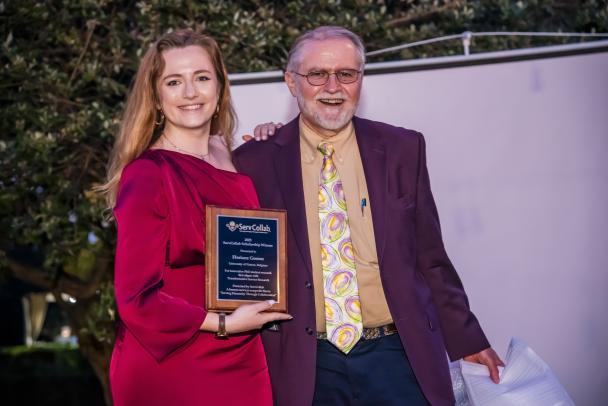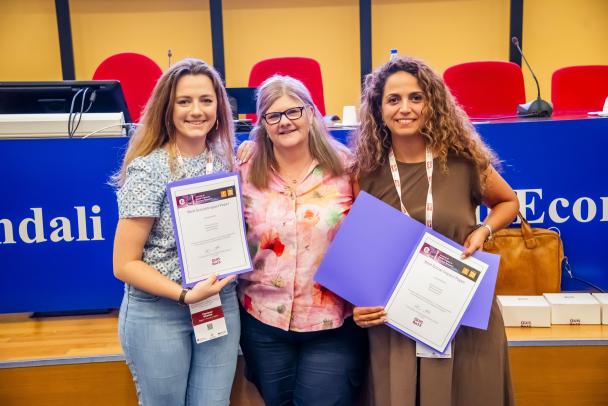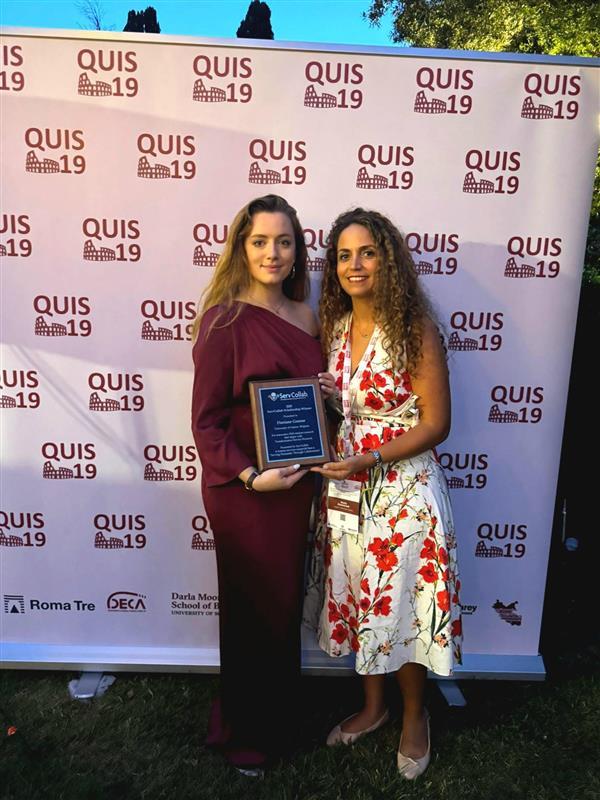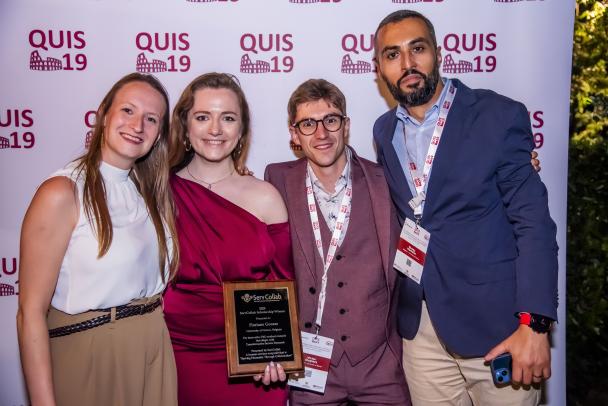The UNamur School of Management (UNSM) fulfills 3 main missions: the organization of undergraduate (Bachelors), graduate (Masters) and postgraduate (Doctorate) management courses, the hosting of its members' research activities and the development and maintenance of links with the economic world.
Presentation
The UNamur School of Management (UNSM) brings together UNamur's leading management experts. It comprises 16 academics, 50 collaborators (experts from other academic institutions or the business world), 9 research assistants, 20 researchers or post-docs and 4 administrative staff.
In order to encourage the emergence of themes that can draw on a critical mass, the School has opted to align the teaching and research areas of its members. This approach facilitates the organization of course programs, the development of research projects and the supervision of scientists. Thus, 4 major course themes, linked to those of the university's institutes and research centers, have been identified:
- Digital and information management (NADI/MINDIT & FOCUS)
- Finance and quantitative methods (DeFiPP/CeReFiM and naXys)
- Innovation, creativity and entrepreneurship (NADI/CIRCé)
- Service and marketing management (NADI/CeRCLe)
For courses requiring skills not found among its members, the UNamur School of Management (UNSM) relies on outside experts from both the academic and business worlds.
Find out more about the UNamur School of Management (UNSM)
Spotlight
News
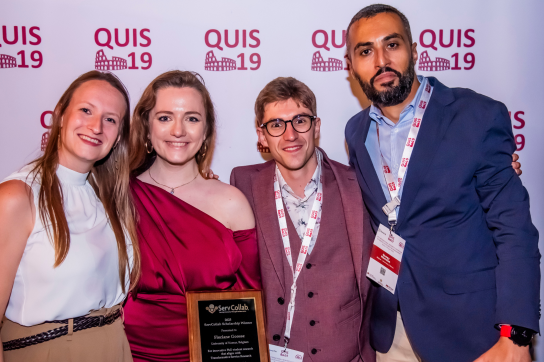
EMCP Faculty: three researchers win awards - #3 When AI becomes more human: Florence Nizette (NaDI) wins an international award
EMCP Faculty: three researchers win awards - #3 When AI becomes more human: Florence Nizette (NaDI) wins an international award
This summer's third and final focus on the NaDI-CeRCLe research center, which has gained international recognition in recent weeks thanks to awards won by three young researchers in service management. Following on from Floriane Goosse and Victor Sluÿters, we invite you to discover the work of Florence Nizette, a young researcher working on Artificial Intelligence technologies.
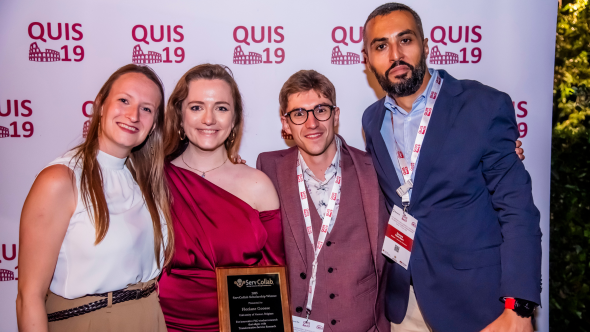
It was at an international, multidisciplinary conference organized by the University of Zaragoza (Spain), AIRSI 2025, which brings together over 200 researchers around 4.0 technologies (artificial intelligence, robotics, virtual assistants, avatars, metavers, augmented reality, big data, etc.), that Florence Nizette brilliantly received the Best Paper Award for an article from her thesis in artificial intelligence.
.More transparent and trustworthy AI services
In her thesis, Florence Nizette looks at user confidence in AI technologies, and in particular at the notion of their "explainability" (XAI). An essential aspect in making these tools more understandable, at a time when their use is only increasing in many sectors.
The originality of Florence Nizette's work lies in the deployment of a multi-stakeholder perspective, an aspect as yet little studied in the literature yet crucial to fostering the adoption of these tools. "I interviewed various actors in sensitive sectors such as finance or insurance, where trust is key: company executives, managers, experts, developers and users with the aim of gaining a global view of how to improve the explicability of AI services. My work consisted in identifying the expectations and constraints encountered by each of the stakeholders with the aim of building bridges between these different actors and seeing how they can collaborate to improve AI-enabled services."
By reconceptualizing explicability as a human-centric challenge, Florence Nizette's study provides theoretical and practical keys to developing more transparent and trustworthy AI systems, aligned with business needs and compliant with regulations.
Research conducted at UNamur and Hasselt University
For this project - based on interviews conducted internationally with XAI players and stakeholders - Florence Nizette benefits from the guidance of its promoters, Professors Wafa Hammedi (UNamur), Allard Van Riel (Hasselt University) and Nadia Steils (HEC Liège). Indeed, the researcher has the particularity of conducting her research at both UNamur and Hasselt University. An advantage in her view: "It's very enriching, both from an intellectual point of view and in terms of access to resources and networks in both regions", explains Florence Nizette.
A career guided by rigor, curiosity and a taste for exchange
Beyond the scientific aspect, Florence emphasizes the human richness of her career. As part of the dynamic team at the NaDI-CeRCLe research center, she emphasizes the mutual support and collaboration that prevail within her group, while also having the opportunity to exchange with different teams at other universities and internationally. The guidance of her three promoters, each bringing a singular perspective to her work, has been invaluable support throughout.
According to Florence, the singularity of her career path lies in this openness: learning and progressing by helping others and receiving their advice, finding enrichment in the diversity of collaborations and points of view. "What stimulates me in a PhD is scientific discovery as much as human interaction: the discussions, the collaborations, the diversity of perspectives", she explains. An experience that is both formative and deeply human, illustrating the power of networking, sharing and international openness.
Florence has benefited from the academic anchorage offered by a community of researchers in service, both nationally and internationally. The scientific rigor, methodological rigor and quality of exchanges that characterize this community represent an invaluable opportunity for any young researcher. This environment has nurtured his scientific maturity and enabled him to raise his work to a higher level.
The research center, with its stimulating yet caring atmosphere, provides fertile ground for academic development. Added to this is the participation in or organization of events of international stature, such as Let's Talk About Service (LTAS), the benchmark conference by the American Marketing Association, held in 2023 in Namur, as well as seminars regularly hosting renowned researchers. These experiences have not only enabled her to integrate the highest standards of the discipline, but also to challenge herself in order to develop and refine her skills as a researcher.
.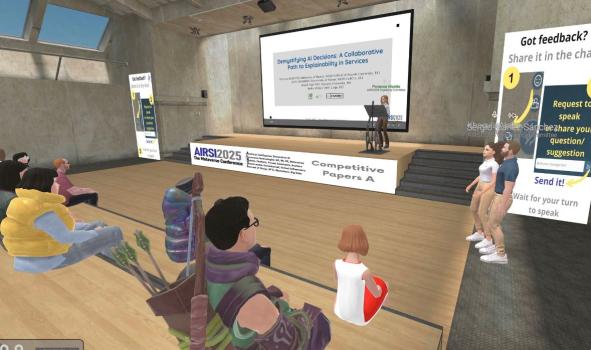

A PhD is more than research; it is a journey of growth, curiosity, and resilience. Every challenge faced is an opportunity to learn and every discovery is a step toward making a meaningful impact.
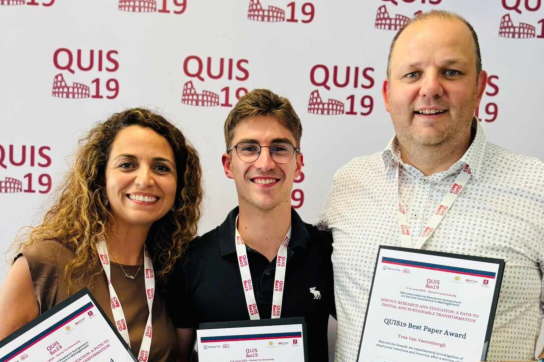
EMCP Faculty: three award-winning researchers - #2 Victor Sluÿters, the doctoral student who deciphers employee behavior in crisis situations
EMCP Faculty: three award-winning researchers - #2 Victor Sluÿters, the doctoral student who deciphers employee behavior in crisis situations
A flurry of awards for the NaDI-CeRCLe research center in recent weeks. The service management research of three young doctoral students from the EMCP Faculty has been recognized by their peers at leading international scientific events: Floriane Goosse, Victor Sluÿters and Florence Nizette. This summer, we invite you to discover their careers and their work.
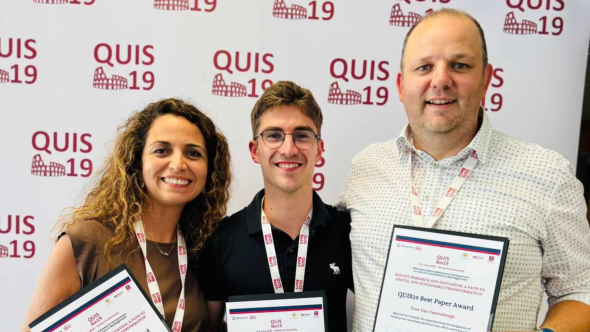
In early June, the 19th International Research Symposium on Service Excellence in Management (QUIS19) was held in Rome, one of the most important conferences in the field of service management. An enriching experience in more ways than one for Victor Sluÿters, a PhD student at the NaDI-CeRCLe research center, who was awarded the "Best Paper Award" by an international jury from over 350 papers.
"Typically, the award is given to a presentation that fits in with the conference theme, which this year focused on digital and sustainable transformation.Although my research project is currently attracting quite a bit of attention, it deviated quite a bit from this theme. So I didn't expect to win an award," confides Victor Sluÿters.
An original approach to crisis management
The thesis paper by Victor Sluÿters - whose work is supervised by Professors Wafa Hammedi (UNamur), Yves Van Vaerenbergh (KU Leuven) and Thomas Leclercq (IÉSEG School of Management) - focuses on data breaches (or data breach) and their management by companies. These are well-known threats feared by organizations for their potentially severe and far-reaching consequences.
Victor Sluÿters focuses more specifically on the psychological mechanisms of shame that underpin employee behavior in a crisis context. This emotion has strong and lasting effects on employee commitment, performance and well-being. Companies therefore have a vested interest in understanding the behavioral mechanisms at work to better cope with this type of event. It was this in-depth psychological dimension of crisis management, still relatively unexplored in the literature, that convinced the QUIS jury.
A human adventure above all
Beyond the scientific recognition, Victor Sluÿters insists on the human aspect of his research work. "We started our thesis at the same time as Floriane [Goosse] and Florence [Nizette]. We really help each other out. We organized very critical proofreading sessions, sometimes tough, but always benevolent.""What's more, we're lucky enough to benefit from excellent support from our promoter, Professor Wafa Hammedi, from both a research and human point of view. And for my part, I can also count on the invaluable insight and support of my two other co-promoters, Yves Van Vaerenbergh and Thomas Leclercq, who contribute enormously to enriching this adventure.", continues the young researcher.

Through the doctoral path, you grow as a person and I'm extremely grateful for everything they offer me on a daily basis as well as for the positive atmosphere I'm lucky enough to evolve in.
Zoom: Research in service management
Service management is a field of research concerned with the methods, practices and tools used to design, produce and evaluate the performance of a service activity. NaDI-CeRCLe is one of the leading players in this particular field of research.
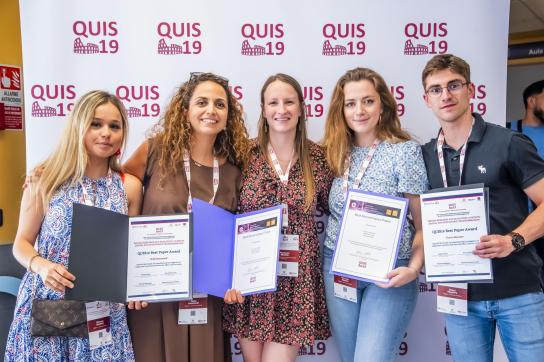
EMCP Faculty: three researchers receive awards - #1 Floriane Goosse receives double award for her research with societal impact
EMCP Faculty: three researchers receive awards - #1 Floriane Goosse receives double award for her research with societal impact
The NaDI-CeRCLe research center has distinguished itself brilliantly on the international scene in recent weeks. Three young researchers from the EMCP Faculty have received prestigious recognition at leading international events for their research in service management: they are Floriane Goosse, Victor Sluÿters and Florence Nizette. This summer, let's discover the work of these PhD students and their significant contributions to the advancement of knowledge and practice in this field.
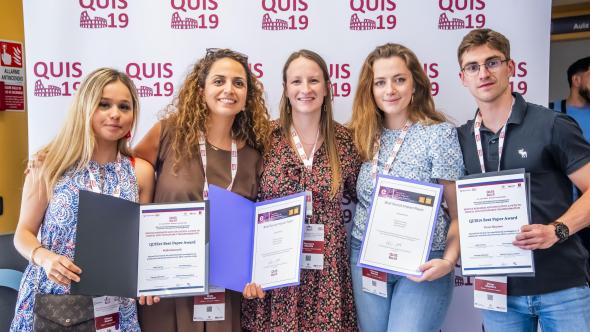
After winning the prestigious "Best Research Paper Award" at the SERVSIG conference by the American Marketing Association in 2024 for her thesis paper, Floriane Goosse, a researcher at the NaDI-CeRCLe research center, is among the two winners of the ServCollab Scholarship 2025, an international doctoral scholarship awarded by an American organization dedicated to promoting scientific research with high societal impact.
No fewer than 37 doctoral students from universities around the world were in the running to receive this scholarship. Two researchers were chosen after an in-depth selection process: Griffin Colaizzi, a PhD student in psychology at Northeastern University (USA), and Floriane Goosse, a PhD student at UNamur within NaDI-CeRCLE.
New technologies to empower people with disabilities
Supervised by Professors Wafa Hammedi (UNamur) and Dominik Mahr (Maastricht University), Floriane Goosse's thesis explores how new technologies, such as intelligent voice assistants, can empower people with disabilities, particularly the visually impaired, and thus significantly improve their well-being.
A high-potential project that convinced the members of the ServCollab jury, made up of eminent researchers in the field. The jury was particularly impressed by the young researcher's methodological rigor and praised her alignment with the principles of Transformative Service Research as well as her deep determination to create a tangible impact on the lives of so-called vulnerable people.
Triple recognition for Floriane Goosse
Floriane Goosse also took part in the 19th International Research Symposium on Service Excellence in Management (QUIS19), the bi-annual benchmark conference in service management, held in Rome in early June. On this occasion, his research once again distinguished itself by winning the prize for best research with societal impact, awarded by the conference's scientific committee. This prestigious international recognition crowns a rigorous and deeply committed body of work. Three major recognitions in less than a year, saluting both the scientific excellence and the strong societal impact of a particularly promising piece of research.
.
This recognition means a lot to me, and is a great encouragement for the continuation of my work, which I'm carrying out in collaboration with my co-sponsors, Professor Wafa Hammedi (NaDI-CeRCLE) and Professor Dominik Mahr (University of Maastricht). In my own small way, I'm delighted to be helping to change perspectives in the field of marketing, which is often focused on the corporate world, by putting research at the service of the community.
Find out more about NaDI-CeRCLe
The aim of the NaDI-CeRCLe Research Center is to actively promote theoretical and empirical research, both fundamental and applied, in the field of marketing and services, and more specifically in the areas of consumption and leisure.
.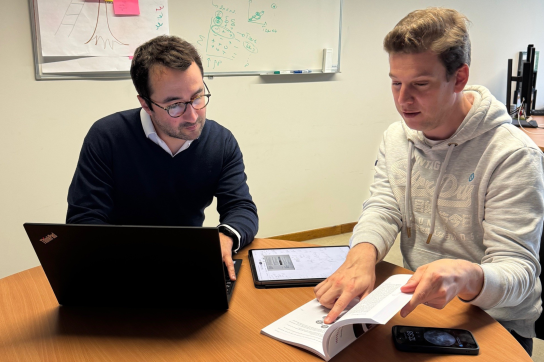
Motivation, leadership and AI: three levers to transform hospital practices
Motivation, leadership and AI: three levers to transform hospital practices
In a fast-changing hospital sector, with ever-increasing demands for performance and innovation, project management plays a key role. Kevin Lejeune, Program Manager at CHU UCL Namur, is tackling these challenges as part of a management thesis at the University of Namur, within the EMCP Faculty (Economics, Management, Communication and SciencesPo), under the supervision of Professor Corentin Burnay. His ambition: to understand and structure the human and technological dynamics shaping hospital governance, and propose concrete levers to support its transformation.
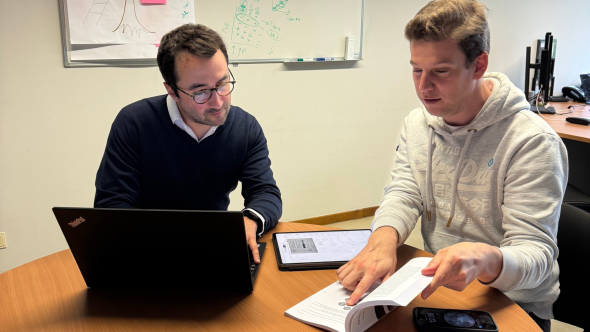
With its 5,000 employees, CHU UCL Namur is a unique field of study. A university hospital and the leading private employer in the province of Namur, it combines care, teaching and research missions, while facing the challenges of a constantly evolving organization. In this context, better structuring projects, reinforcing strategic steering and intelligently integrating technological innovation is becoming an imperative to guarantee the efficiency of processes and the sustainability of the reforms undertaken.
In contrast to other sectors, where projects are often entrusted to professionals trained in classic project management methodologies, hospitals rely mainly on non-professional project managers. These players, be they doctors, nurses, pharmacists, biologists, administrative staff, etc., regularly find themselves piloting strategic initiatives without dedicated project management training. Kevin Lejeune is interested in this reality, and seeks to understand how their intrinsic motivation and ability to structure initiatives in an informal setting influence the success of hospital projects. His doctoral thesis is part of a wider reflection on the balance between professionalization and organizational agility, supported by the academic expertise of UNamur.
While the sponsor is often presented as a key figure in projects, his role remains unclear and unevenly invested in reality. To what extent does his real involvement and interaction with the project manager influence the success of hospital initiatives? Drawing on the theory of leader-member exchange, Kevin Lejeune sets out to demonstrate that it's not so much the presence of the sponsor that matters, as the quality of his or her commitment. His work highlights three essential levers: the sponsor's concrete actions, his relational qualities and his level of involvement. This theoretical framework, nurtured by regular exchanges with the academic world of the EMCP Faculty, aims to provide tangible recommendations for rethinking leadership in hospital governance and better structuring the support of project managers.
The rise of artificial intelligence in healthcare opens up promising prospects, but also raises organizational and psychological resistance. How can we ensure that these tools do not remain isolated experiments, but become genuine catalysts for innovation within healthcare establishments? This is the issue that Kevin Lejeune explores in the final part of his research. He aims to identify the factors that influence the acceptance and integration of AI tools into hospital processes. Far from taking a purely technological approach, he focuses on the psychological and behavioral barriers that condition the adoption of these innovations. In particular, it analyzes the impact of perceived competence, self-esteem and professional recognition on the adoption of AI tools. By crossing hospital fieldwork and academic contributions, notably from UNamur, the aim is to propose implementation strategies adapted to the human dynamics specific to hospitals.
Through this thesis, Kevin Lejeune aims to offer hospitals operational keys to improve the management of their projects, structure the role of sponsors and support the adoption of technological innovations. Combining scientific rigor with a grounding in the field, his work is based on a dual approach: deciphering hospital organizational mechanisms to identify levers for improvement, and ensuring that these recommendations can be implemented pragmatically.
Beyond his research, he shares his expertise by leading project management training courses tailored to the hospital sector, and works with several institutions in Belgium and Benin. This involvement enables him to test the lessons learned from his research in real-life conditions, and to contribute to a sustainable transformation of healthcare organizations, in close collaboration with his scientific supervision at UNamur.
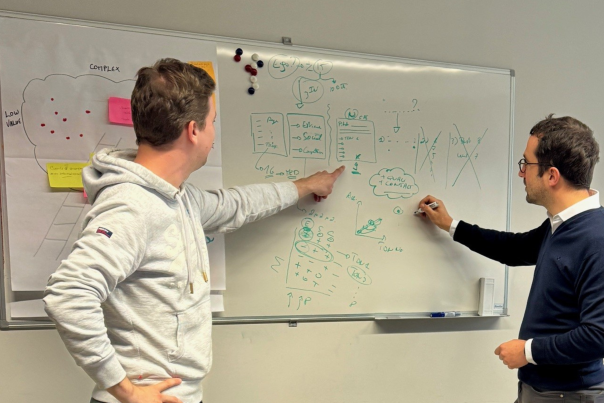
Discover Management studies :
Discover management research :

EMCP Faculty: three researchers win awards - #3 When AI becomes more human: Florence Nizette (NaDI) wins an international award
EMCP Faculty: three researchers win awards - #3 When AI becomes more human: Florence Nizette (NaDI) wins an international award
This summer's third and final focus on the NaDI-CeRCLe research center, which has gained international recognition in recent weeks thanks to awards won by three young researchers in service management. Following on from Floriane Goosse and Victor Sluÿters, we invite you to discover the work of Florence Nizette, a young researcher working on Artificial Intelligence technologies.

It was at an international, multidisciplinary conference organized by the University of Zaragoza (Spain), AIRSI 2025, which brings together over 200 researchers around 4.0 technologies (artificial intelligence, robotics, virtual assistants, avatars, metavers, augmented reality, big data, etc.), that Florence Nizette brilliantly received the Best Paper Award for an article from her thesis in artificial intelligence.
.More transparent and trustworthy AI services
In her thesis, Florence Nizette looks at user confidence in AI technologies, and in particular at the notion of their "explainability" (XAI). An essential aspect in making these tools more understandable, at a time when their use is only increasing in many sectors.
The originality of Florence Nizette's work lies in the deployment of a multi-stakeholder perspective, an aspect as yet little studied in the literature yet crucial to fostering the adoption of these tools. "I interviewed various actors in sensitive sectors such as finance or insurance, where trust is key: company executives, managers, experts, developers and users with the aim of gaining a global view of how to improve the explicability of AI services. My work consisted in identifying the expectations and constraints encountered by each of the stakeholders with the aim of building bridges between these different actors and seeing how they can collaborate to improve AI-enabled services."
By reconceptualizing explicability as a human-centric challenge, Florence Nizette's study provides theoretical and practical keys to developing more transparent and trustworthy AI systems, aligned with business needs and compliant with regulations.
Research conducted at UNamur and Hasselt University
For this project - based on interviews conducted internationally with XAI players and stakeholders - Florence Nizette benefits from the guidance of its promoters, Professors Wafa Hammedi (UNamur), Allard Van Riel (Hasselt University) and Nadia Steils (HEC Liège). Indeed, the researcher has the particularity of conducting her research at both UNamur and Hasselt University. An advantage in her view: "It's very enriching, both from an intellectual point of view and in terms of access to resources and networks in both regions", explains Florence Nizette.
A career guided by rigor, curiosity and a taste for exchange
Beyond the scientific aspect, Florence emphasizes the human richness of her career. As part of the dynamic team at the NaDI-CeRCLe research center, she emphasizes the mutual support and collaboration that prevail within her group, while also having the opportunity to exchange with different teams at other universities and internationally. The guidance of her three promoters, each bringing a singular perspective to her work, has been invaluable support throughout.
According to Florence, the singularity of her career path lies in this openness: learning and progressing by helping others and receiving their advice, finding enrichment in the diversity of collaborations and points of view. "What stimulates me in a PhD is scientific discovery as much as human interaction: the discussions, the collaborations, the diversity of perspectives", she explains. An experience that is both formative and deeply human, illustrating the power of networking, sharing and international openness.
Florence has benefited from the academic anchorage offered by a community of researchers in service, both nationally and internationally. The scientific rigor, methodological rigor and quality of exchanges that characterize this community represent an invaluable opportunity for any young researcher. This environment has nurtured his scientific maturity and enabled him to raise his work to a higher level.
The research center, with its stimulating yet caring atmosphere, provides fertile ground for academic development. Added to this is the participation in or organization of events of international stature, such as Let's Talk About Service (LTAS), the benchmark conference by the American Marketing Association, held in 2023 in Namur, as well as seminars regularly hosting renowned researchers. These experiences have not only enabled her to integrate the highest standards of the discipline, but also to challenge herself in order to develop and refine her skills as a researcher.
.

A PhD is more than research; it is a journey of growth, curiosity, and resilience. Every challenge faced is an opportunity to learn and every discovery is a step toward making a meaningful impact.

EMCP Faculty: three award-winning researchers - #2 Victor Sluÿters, the doctoral student who deciphers employee behavior in crisis situations
EMCP Faculty: three award-winning researchers - #2 Victor Sluÿters, the doctoral student who deciphers employee behavior in crisis situations
A flurry of awards for the NaDI-CeRCLe research center in recent weeks. The service management research of three young doctoral students from the EMCP Faculty has been recognized by their peers at leading international scientific events: Floriane Goosse, Victor Sluÿters and Florence Nizette. This summer, we invite you to discover their careers and their work.

In early June, the 19th International Research Symposium on Service Excellence in Management (QUIS19) was held in Rome, one of the most important conferences in the field of service management. An enriching experience in more ways than one for Victor Sluÿters, a PhD student at the NaDI-CeRCLe research center, who was awarded the "Best Paper Award" by an international jury from over 350 papers.
"Typically, the award is given to a presentation that fits in with the conference theme, which this year focused on digital and sustainable transformation.Although my research project is currently attracting quite a bit of attention, it deviated quite a bit from this theme. So I didn't expect to win an award," confides Victor Sluÿters.
An original approach to crisis management
The thesis paper by Victor Sluÿters - whose work is supervised by Professors Wafa Hammedi (UNamur), Yves Van Vaerenbergh (KU Leuven) and Thomas Leclercq (IÉSEG School of Management) - focuses on data breaches (or data breach) and their management by companies. These are well-known threats feared by organizations for their potentially severe and far-reaching consequences.
Victor Sluÿters focuses more specifically on the psychological mechanisms of shame that underpin employee behavior in a crisis context. This emotion has strong and lasting effects on employee commitment, performance and well-being. Companies therefore have a vested interest in understanding the behavioral mechanisms at work to better cope with this type of event. It was this in-depth psychological dimension of crisis management, still relatively unexplored in the literature, that convinced the QUIS jury.
A human adventure above all
Beyond the scientific recognition, Victor Sluÿters insists on the human aspect of his research work. "We started our thesis at the same time as Floriane [Goosse] and Florence [Nizette]. We really help each other out. We organized very critical proofreading sessions, sometimes tough, but always benevolent.""What's more, we're lucky enough to benefit from excellent support from our promoter, Professor Wafa Hammedi, from both a research and human point of view. And for my part, I can also count on the invaluable insight and support of my two other co-promoters, Yves Van Vaerenbergh and Thomas Leclercq, who contribute enormously to enriching this adventure.", continues the young researcher.

Through the doctoral path, you grow as a person and I'm extremely grateful for everything they offer me on a daily basis as well as for the positive atmosphere I'm lucky enough to evolve in.
Zoom: Research in service management
Service management is a field of research concerned with the methods, practices and tools used to design, produce and evaluate the performance of a service activity. NaDI-CeRCLe is one of the leading players in this particular field of research.

EMCP Faculty: three researchers receive awards - #1 Floriane Goosse receives double award for her research with societal impact
EMCP Faculty: three researchers receive awards - #1 Floriane Goosse receives double award for her research with societal impact
The NaDI-CeRCLe research center has distinguished itself brilliantly on the international scene in recent weeks. Three young researchers from the EMCP Faculty have received prestigious recognition at leading international events for their research in service management: they are Floriane Goosse, Victor Sluÿters and Florence Nizette. This summer, let's discover the work of these PhD students and their significant contributions to the advancement of knowledge and practice in this field.

After winning the prestigious "Best Research Paper Award" at the SERVSIG conference by the American Marketing Association in 2024 for her thesis paper, Floriane Goosse, a researcher at the NaDI-CeRCLe research center, is among the two winners of the ServCollab Scholarship 2025, an international doctoral scholarship awarded by an American organization dedicated to promoting scientific research with high societal impact.
No fewer than 37 doctoral students from universities around the world were in the running to receive this scholarship. Two researchers were chosen after an in-depth selection process: Griffin Colaizzi, a PhD student in psychology at Northeastern University (USA), and Floriane Goosse, a PhD student at UNamur within NaDI-CeRCLE.
New technologies to empower people with disabilities
Supervised by Professors Wafa Hammedi (UNamur) and Dominik Mahr (Maastricht University), Floriane Goosse's thesis explores how new technologies, such as intelligent voice assistants, can empower people with disabilities, particularly the visually impaired, and thus significantly improve their well-being.
A high-potential project that convinced the members of the ServCollab jury, made up of eminent researchers in the field. The jury was particularly impressed by the young researcher's methodological rigor and praised her alignment with the principles of Transformative Service Research as well as her deep determination to create a tangible impact on the lives of so-called vulnerable people.
Triple recognition for Floriane Goosse
Floriane Goosse also took part in the 19th International Research Symposium on Service Excellence in Management (QUIS19), the bi-annual benchmark conference in service management, held in Rome in early June. On this occasion, his research once again distinguished itself by winning the prize for best research with societal impact, awarded by the conference's scientific committee. This prestigious international recognition crowns a rigorous and deeply committed body of work. Three major recognitions in less than a year, saluting both the scientific excellence and the strong societal impact of a particularly promising piece of research.
.
This recognition means a lot to me, and is a great encouragement for the continuation of my work, which I'm carrying out in collaboration with my co-sponsors, Professor Wafa Hammedi (NaDI-CeRCLE) and Professor Dominik Mahr (University of Maastricht). In my own small way, I'm delighted to be helping to change perspectives in the field of marketing, which is often focused on the corporate world, by putting research at the service of the community.
Find out more about NaDI-CeRCLe
The aim of the NaDI-CeRCLe Research Center is to actively promote theoretical and empirical research, both fundamental and applied, in the field of marketing and services, and more specifically in the areas of consumption and leisure.
.
Motivation, leadership and AI: three levers to transform hospital practices
Motivation, leadership and AI: three levers to transform hospital practices
In a fast-changing hospital sector, with ever-increasing demands for performance and innovation, project management plays a key role. Kevin Lejeune, Program Manager at CHU UCL Namur, is tackling these challenges as part of a management thesis at the University of Namur, within the EMCP Faculty (Economics, Management, Communication and SciencesPo), under the supervision of Professor Corentin Burnay. His ambition: to understand and structure the human and technological dynamics shaping hospital governance, and propose concrete levers to support its transformation.

With its 5,000 employees, CHU UCL Namur is a unique field of study. A university hospital and the leading private employer in the province of Namur, it combines care, teaching and research missions, while facing the challenges of a constantly evolving organization. In this context, better structuring projects, reinforcing strategic steering and intelligently integrating technological innovation is becoming an imperative to guarantee the efficiency of processes and the sustainability of the reforms undertaken.
In contrast to other sectors, where projects are often entrusted to professionals trained in classic project management methodologies, hospitals rely mainly on non-professional project managers. These players, be they doctors, nurses, pharmacists, biologists, administrative staff, etc., regularly find themselves piloting strategic initiatives without dedicated project management training. Kevin Lejeune is interested in this reality, and seeks to understand how their intrinsic motivation and ability to structure initiatives in an informal setting influence the success of hospital projects. His doctoral thesis is part of a wider reflection on the balance between professionalization and organizational agility, supported by the academic expertise of UNamur.
While the sponsor is often presented as a key figure in projects, his role remains unclear and unevenly invested in reality. To what extent does his real involvement and interaction with the project manager influence the success of hospital initiatives? Drawing on the theory of leader-member exchange, Kevin Lejeune sets out to demonstrate that it's not so much the presence of the sponsor that matters, as the quality of his or her commitment. His work highlights three essential levers: the sponsor's concrete actions, his relational qualities and his level of involvement. This theoretical framework, nurtured by regular exchanges with the academic world of the EMCP Faculty, aims to provide tangible recommendations for rethinking leadership in hospital governance and better structuring the support of project managers.
The rise of artificial intelligence in healthcare opens up promising prospects, but also raises organizational and psychological resistance. How can we ensure that these tools do not remain isolated experiments, but become genuine catalysts for innovation within healthcare establishments? This is the issue that Kevin Lejeune explores in the final part of his research. He aims to identify the factors that influence the acceptance and integration of AI tools into hospital processes. Far from taking a purely technological approach, he focuses on the psychological and behavioral barriers that condition the adoption of these innovations. In particular, it analyzes the impact of perceived competence, self-esteem and professional recognition on the adoption of AI tools. By crossing hospital fieldwork and academic contributions, notably from UNamur, the aim is to propose implementation strategies adapted to the human dynamics specific to hospitals.
Through this thesis, Kevin Lejeune aims to offer hospitals operational keys to improve the management of their projects, structure the role of sponsors and support the adoption of technological innovations. Combining scientific rigor with a grounding in the field, his work is based on a dual approach: deciphering hospital organizational mechanisms to identify levers for improvement, and ensuring that these recommendations can be implemented pragmatically.
Beyond his research, he shares his expertise by leading project management training courses tailored to the hospital sector, and works with several institutions in Belgium and Benin. This involvement enables him to test the lessons learned from his research in real-life conditions, and to contribute to a sustainable transformation of healthcare organizations, in close collaboration with his scientific supervision at UNamur.





